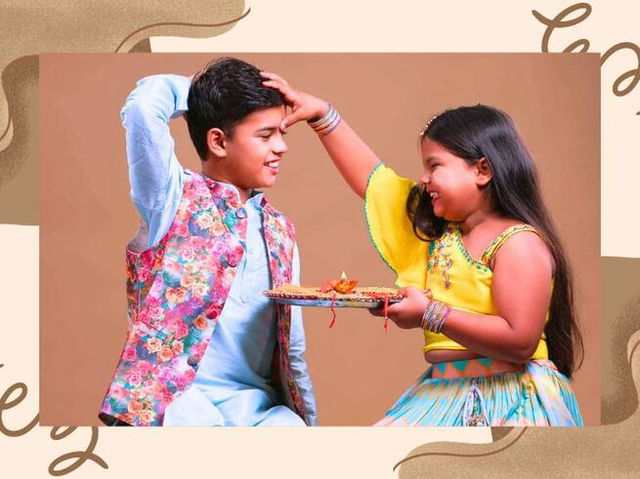Bhai Dooj, the beloved Hindu festival that celebrates the bond between brothers and sisters falls on the second day of the Shukla Paksha or bright fortnight in the Hindu month of Kartika. In the Gregorian calendar, it usually falls in late October or early to mid-November.
Bhai Dooj is celebrated in different regions under various names, such as Bhai Phonta, Bhaubeej, and Bhai Tika.
The festival is followed by wholesome rituals where sisters pray for their brothers' well-being and long lives, while brothers vow to protect and support their sisters.
Similar to that of Raksha Bandhan, Bhai Dooj embodies the deep love and affection between siblings and brings families together in the festive ambiance of Diwali or Tihar.

Bhai Dooj Date And Time (Muhurat) In 2025
Bhai Dooj in 2025 will be observed on Thursday, October 23, with the Aparahna time from 1:13 PM to 3:28 PM, lasting for 2 hours and 15 minutes. The Dwitiya Tithi begins at 8:16 PM on October 22 and ends at 10:46 PM on October 23.
The Story of Bhai Dooj
There are several stories spinning around the origin of Bhai Dooj which can be found in Hindu mythology.
Celebrated for centuries, this festival has two popular legends explaining its establishment.
One of them involves Lord Krishna and his sister Subhadra which says that when Lord Krishna came home after his triumph over Naraksura, Subhadra welcomed him with flowers and sweets and by performing a ritual of applying holy tilak on his forehead. This is said to be the beginning of Bhai Dooj.
Another legend states that Yamuna, the sister of the God of Death Yama invited his brother to her home. Yama accepted her invitation and visited her two days after the new moon, and he had a very grand welcome by performing a ceremony to pray for his long life and well-being.
Lord Yama was so touched by this gesture that he announced any brother who receives a similar welcome from his sister on this day would be blessed with a long and happy life. Since then, the festival became known as Yamadvitiya or Yama Dwitiya and is celebrated as Bhai Dooj across the country.
Bhai Dooj in Different Regions of The Country
Bhai Dooj in Northern India
Bhai Dooj is celebrated across Northern India and the rituals include apply a red "tilak" on the forehead of their brothers, perform aarti and exchange gifts. It is also known as Bhaiya Dooj in Bihar and Uttar Pradesh.
Bhai Tika in Nepal
Known as Bhai Tika in Nepal, it is observed on the fifth day of the Tihar festival and is considered one of the most significant festivals after Dashain. On this day, like the rest of the country sisters apply a tilak, but it is a colorful or seven-colored tilak also known Saptarangi Tika on their brothers' foreheads. The Newar community also celebrates the festival as Kija Puja, with similar rituals to honor the bond between siblings.
Bhai Phonta in Bengal
Known as Bhai Phonta in West Bengal and Tripura, it is celebrated with great grandeur on the second day after Kali Puja. The rituals are similar to those in other regions and involve sisters applying "phonta" (a mark of sandalwood paste or sometimes kohl) on their brothers' foreheads and performing aarti. The day is marked by festive meals and the exchange of gifts, bringing families together in joyous celebration.
Bhau Beej in Maharashtra and Gujarat
Gujarat, Goa and Maharashtra celebrates Bhau Beej or Bhav Bij and sisters prepare a feast for their brothers, do the rituals and enjoy each other's company. In some regions, sisters who do not have brothers worship the moon (Chandra) as a symbolic gesture, praying for protection and happiness.
Bhai Jiuntia in Odisha
In western Odisha, Bhai Dooj is observed as Bhai Jiuntia and the rituals are similar to the rest of the country. The rituals are deeply rooted in tradition, with a strong emphasis on the bond of love and care between siblings.
Rituals of The Ceremony
Sister's Fast
The sisters must keep a fast before performing the Bhai Dooj ceremonies. This is a sign of love and devotion, and in some cases, the brothers fast too. The fast is broken at the end of the rituals when the brothers feed sweets to their sisters.
Tilak Ceremony
The sister applies a sacred tilak (made of vermilion, rice, and sandalwood paste) on her brother's forehead as part of the ritual. While applying the tilak, sisters often chant region-specific mantras that bless the brother with protection from harm and a long, prosperous life. These mantras vary across different parts of India, but they all carry the same essence of love and well-being for the brother.
Special Aarti
Following the tilak, the sister performs an aarti for her brother using a diya (lamp), symbolizing her prayers for his success and happiness. This aarti is a gesture of divine blessings, meant to protect the brother from negative forces.
Gift Exchange
After the aarti, the brother gives his sister gifts as a token of his appreciation and love. These gifts, which can be anything from sweets and clothes to thoughtful presents, signify the brother’s gratitude and commitment to always protect his sister.
Sharing Sweets
The brother and sister then exchange sweets, symbolizing the sweetness of their bond. Traditional Indian sweets like laddoos, barfis, and kheer are shared to celebrate the occasion with joy.
Feasting Together
Many sisters also prepare a special meal for their brothers on this day, and the two share a feast as part of the celebration. The meal, prepared with love and care, strengthens the bond between them.